2015 年专业英语四级考试真题及答案
B. Health.
C. Skills.
D. Calmness.
B. CDs
C. camera
D. food
B. Visiting everyday shops.
SECTION A CONVERSATIONS
1. Why is the trip to Mars a one-way trip?
A. The return trip is too expensive.
B. There is no technology to get people back.
C. People don’t want to return.
D. The return trip is too risky.
2. According to the man, what is more important for those recruits?
A. Intelligence.
3. What is the last part of the conversation about?
A. The kind of people suitable for the trip.
B. Interests and hobbies of the speakers.
C. Recruitment of people for the trip.
D. Preparation for the trip to Mars.
4. What is showrooming?
A. Going to the high street.
C. Buying things like electrical goods.
D. Visiting shops and buying online.
5. According to the conversation, the man had bought all the following things online
EXCEPT
A. shoes
6. According to the conversation, the percentage of people who showroomed while
Christmas shopping was
A. 3%
7. One reason for people to showroom is that they
A. want to know more about pricing
C. want to see the real thing first
8. What is the conversation mainly about?
A. How to avoid clashes of exams.
C. How to use the faculty lounge.
9. What does the student have to do first in order to take the exams?
A. To choose a date on the draft schedule.
B. To find the information on the bulletin board.
C. To draw up the final schedule.
D. To arrange an invigilator.
10. According to the conversation, the Dean will
A. sign the sheet in the faculty lounge
B. take care of the bulletin board
C. consult the students
D. finalize the exam schedule
SECTION B PASSAGES
11. Which of the following cities has the oldest Chinatown in North America?
A. New York.
12. The Chinatown in San Francisco attracts tourists a year.
B. How to schedule exams.
D. How to choose the courses.
D. can bargain for a lower shop price
B. can return the product later
B. San Francisco.
C. Boston.
D. San Diego.
B. 33%
C. 42%
D. 24%
�
B. 100 ,000
C. 7 million
D. 17 million
D. In Bush Street.
B. 9
C. 10
D. 11
B. In Grant Avenue.
B. personality
C. environment
B. gender
C. race
A. 20 ,000
13. Where can tourists see the fish markets?
A. In Stockton Street.
C. In Portsmouth Square.
14. Which of the following is NOT mentioned in the passage?
A. Obesity can damage one’s health.
B. Obesity is a growing problem all over the world.
C. Obesity is directly related to one’s habit.
D. Obesity has affected both boys and girls.
15. The purpose of the three-year study is to .
A. find out why some children find it difficult to go to sleep
B. learn more about the link between sleep and weight
C. identify the ways parents reduce their kids’ weight
D. see if there is difference in sleep patterns over the period
16. According to the study, the daily healthy sleep time for the 3rd to 6th graders
should be around ___ hours.
A. 8
17. According to the passage, obesity is most likely related to __ .
A. sleep time
18. According to a number of students, __ __ is the main factor for early-age smoking.
A. gender
19. Which of the following statements is CORRECT?
A. Very few continue smoking throughout their teenage years.
B. Most early-age smokers soon stop experimenting.
C. Some early-age smokers never go beyond experimenting.
D. Children quickly become regular smokers by carrying cigarettes.
20. All the following are features of smokers EXCEPT ___ .
A. strong peer influence
C. high sense of rebellion
SECTION C NEWS BROADCAST
21. Why were some children offered only fruit and milk for lunch?
A. The school stopped providing school lunch.
B. Their parents failed to pay for school lunch.
C. Some parents preferred fruit and milk for lunch.
D. These children chose to have something different.
22. How did parents react to the school’s way of handling the situation?
A. They were upset
C. They were surprised.
23. According to the news, what is the main advantage of the digital key?
A. Guests can pay without going to the front desk.
B. Guests can go direct to their rooms.
C. Guests can check out any time.
D. Guests can make room reservations.
24. The hotel company intends to have the system in ___ of its hotels in the next
B. low sense of achievement
D. close family relationship
B. They were furious.
D. parents
D. money
D. They were sad.
�
B. 3
C. 100
D. 150
B. Killing his wife in the U.K.
D. Hiring a crew of hit men.
three months.
A. 2
25. According to the court ruling, Shrien Dewani _ ___ .
A. will return to the U.K. for medical treatment
B. will remain in South Africa for medical treatment
C. will stand trial in South Africa once proved fit
D. will be extradited even if he is unfit to stand trial
26. What was Dewani accused of?
A. Having his wife killed.
C. Being involved in a taxi accident.
27. The U.N. new vote would allow all the following EXCEPT ___ .
A. the use of force by European Union troops
B. the suspension of an existing arms embargo
C. the extension of U.N. peacekeeping mission
D. the ban on travel and freeze of assets
28. What is the news mainly about?
A. Causes of early death in Russia.
C. Causes of alcohol poisoning.
29. The total investment in film-making in Britain in 2012 was __ __ .
A. £945 million
30. Hollywood studios prefer to make films in Britain because ___ .
A. The UK is a good film location
B. The cast usually comes from Britain
C. Hollywood emphasizes quality
D. Production cost can be reduced
PART III
Electricity
D. Number of death over 10 years.
B. Behavior of alcoholics.
B. £1.07 billion
CLOZE
is
C. £500,000
D. £87,000
everyday
lives
part
such
our
and
of
a
so
much
for
granted
nowadays 31
___
we
taken
rarely
set. At
ove
33
think
twice
when
night,
roads
we
switch
are brightly
in
freely. Neon
___
of
every
lighting used
city.
modern
In
or
the
light
on
lit,enabling people
advertising
the home,
has become
many
34
turn on
and32
part
of
___
devices
TV
the
___ to
m
the
ar
___
lamp
our
and are
36
___
asleep,
electricit
our water,
or
keeping
our
rooms
air-conditioned.
from work.
___
something
something
We
rarely
38
goes wrong.
___ to
consider
why
40
___ go
wrong
with
the
power-p
powered
by
e
turn
when we
y
working
refrigerators,
is
Every
subways
day,
take
electricity. 35
off
for
heating
the bedside
us, 37
___
buses
and
trains,
us
to
and
run——39
1959,
of
or
how
they
summer
the
In
lant that
with electricity.
___.
Trains
provided New
For
refused
York
a
to
great
move
rk,
42
___ to
do
anything;
many
and
lifts
hours,
life
came
almost
to
a
41
people
in
the
stopped
working,
them
so
sat
that
in
43
the
da
___ y
�
D. driving
B. would
were
lucky
enough
not
unpleasant
streets
task of
like
Broadway
to
be
finding
44.
your
and Fifth
___
between two
floors,
you
ha
way
Avenue
down
in
45
a(n)
___ of
stairs.
46
___
became
ou
d
the
Famous
as
People
we
emergency,
___ as
D. even if
B. powerless
B. character
D. surface
47
their
as
else.
D. standstill
C. until
D. after
C. could
D. Should
B. truck
C. traffic
police
just
most
remote
back
streets.
afraid
___
.
D. labor-saving
and
uninviting
anybody
D. so
had
been ordered
to
49
___
in
case o
___ the
houses,
B. placed
B. levels
C. hesitant D. helpless
C. hesitate D. remember
leave
to
although the
were
they
B. terminal C. breakdown
C. Even D. Frequently
C. closely
D. quickly
B. starting C. repairing
B. bother
D. pedestrians
C. distinction
C. energy-saving
gloomy
re
48
f
confused and50
31. A. that B. thus C. as
32. A. car
33. A. appearance
34. A. money-saving B. time-saving
35. A. Only B. Rarely
36. A. fast B. quite
37. A. moving
38. A. trouble
39. A. when B. if
40. A. did
41. A. pause
42. A. incompetent
43. A. although B. when C. as
44. A. trapped
45. A. steps
46. A. time B. instant
47. A. like B. than C. for
D. as
48. A. for
C. but
B. and
D. or
49. A. stand aside
B. stand down
50. A. aimless
PART IV GRAMMAR AND VOCABULARY
51. When you have finished with that book, don’t forget to put it back on the shelf,
____?
A. don’t you
52. Mary is __ ___ hardworking than her sister, but she failed in the exam.
A. no less
D. not so
53. Which of the following statements is INCORRECT?
A. Only one out of six were present at the meeting.
B. Ten dollars was stolen from the cash register.
C. Either my sister or my brother is wrong.
D. Five miles seem like a long walk to me.
54. Which of the italicized parts expresses a future tense?
A. My friend teaches chemistry in a school.
B. I’ll give it to you after I return.
C. What is the matter with you?
C. positioned
C. flights
B. helpless C. unfocused
C. standby
D. stand in
D. won’t you
B. do you
C. will you
B. no more
C. not less
C. point
D. minute
D. undecided
D. locked
D. floors
�
D. as
D. Bob did.
B. that
B. remained
B. was
B. Close
C. whether
D. when
C. remain
D. is remaining
C. Rain
D. Belong
B. nor
C. like
C. would be
D. were
D. London stands on the River Thames.
55. It is not so much the language ____ the cultural background that makes the film
difficult to understand.
A. but
56. There is no doubt ____ the committee has made the right decision on the housing
project.
A. why
57. All the President’s Men ____ one of the important books for scholars who study
the Watergate Scandal.
A. remains
58. If you explained the situation to your lawyer, he ___ __ able to advise you much
better than I can.
A. will be
59. Which of the following is a stative verb (静态动词)?
A. Drink
60. Which of the following italicized parts indicates a subject-verb relation?
A. The man has a large family to support.
B. She had no wish to quarrel with her brother.
C. He was the last guest to leave.
D. Mary needs a friend to talk to.
61. The following are all correct responses to “Who told the news to the teacher?”
EXCEPT __ ___?
A. Bob did it
62. Which of the following is INCORRECT?
A. Another two girls
63. Which of the following italicized words does NOT indicate willingness?
A. What will you do when you graduate?
B. They will be home by now.
C. Who will go with me?
D. Why will you go there alone?
64. When one has good health, ___ should feel fortunate
A. you
65. There ____ nothing more for discussion, the meeting came to an end half an hour
earlier.
A. to be
66. Two of her brothers were _ __ during the Second World War.
A. called up
D. called out
67. Bottles from this region sell __ ____ at about $50 a case.
A. entirely
68. The product contains no ____ colours, flavours, or preservatives.
A. fake
69. Davis accepted the defeat in the semi-final with good grace. The underlined part
is closest in meaning to ___ ___.
A. cheerfully
D. A bit of flowers
B. wholeheartedly
B. Bob did so
C. Bob did that
B. she
C. he
B. to have been
C. be
B. called on
C. called for
B. Few words
C. This work
C. false
D. wrong
B. totally
C. wholesale
C. politely
D. quietly
D. we
D. being
D. together
B. artificial
�
B. Civilized
B. relieve
B. depression
B. lay into
B. made up for
C. balanced
C. swelling
D. cut
C. Civilian
D. Civic
C. comfort
D. still
C. lay down
D. lay aside
D. compensated for
70. __ ___ and business leaders were delighted at the decision to hold the national
motor fair in the city.
A. Civil
71. The city council is planning a huge road-building programme to ease congestion.
The underlined part means __ ___.
A. calm
72. His unfortunate appearance was offset by an attractive personality. The
underlined part means all the following EXCEPT ____.
A. improved
73. The doctor said that the gash in his check required stitches. The underlined
part means ____.
A. lump
74. During the economic crisis, they had to cut back production and __ ___ workers.
A. lay off
75. The university consistently receives a high __ ____ for the quality of its
teaching and research.
A. standard
76. To mark its one hundredth anniversary, the university held a series of activities
including conferences, film shows, etc. The underlined part means __ ___.
A. signify
77. His fertile mind keeps turning out new ideas. The underlined part means _ ____.
A. abundant
78. The local news paper has a ___ __ of 100,000 copies a day.
A. spread
79. These issues were discussed at length during the meeting. The underlined part
means __ ___.
A. eventually
80. A couple of young people were giving out leaflets in front of the department
store. The underlined part means __ ___.
A. distributing
PART V READING COMPREHENSION
Text A
B. subsequently
B. handling
C. dividing
B. unbelievable
B. celebrate
C. symbolize
D. suggest
C. productive
D. generative
B. circulation
C. motion
C. rating
D. comment
C. lastly
D. fully
B. evaluation
D. flow
D. arranging
Inundated by more information than we can possibly hold in our head, we're
increasingly handing off the job of remembering to search engines and smart phones.
Google is even reportedly working on eyeglasses that could one day recognize faces
and supply details about whoever you're looking at. But new research shows that
outsourcing our memory – and expecting that information will be continually and
instantaneously available --is changing our cognitive habits.
Research conducted by Betsy Sparrow, an assistant professor of psychology at
Columbia University, has identified three new realities about how we process
information in the Internet age. First, her experiments showed that when we don't
know the answer to a question, we now think about where we can find the nearest Web
connection instead of the subject of the question itself. A second revelation is
�
that when we expect to be able to find information again later on, we don't remember
it as well as when we think it might become unavailable. And then there is the
researchers' final observation: the expectation that we'll he able to locate inf
orination down the line leads us to form a memory not of the fact itself but of where
we'II be able to find it.
But this handoff comes with a downside. Skills like critical thinking and analysis
must develop in the context of facts: we need something to think and reason about,
after all. And these facts can't be Googled as we go;they need to be stored in the
original hard drive, our long-term memory. Especially in the case of children,
"factual knowledge must precede skill," says Daniel Willingham, a professor of
psychology, at the University of Virginia -- meaning that the days of drilling the
multiplication table and memorizing the names of the Presidents aren't over quite
yet. Adults, too, need to recruit a supply of stored knowledge in order to situate
and evaluate new information they encounter. You can't Google context.
Last, there's the possibility, increasingly terrifying to contemplate, that our
machines fail us. As Sparrow puts it, "The experience of losing our Internet
connection becomes more and more like losing a friend." If you're going to keep your
memory on your smart phone, better make sure it's fully charged.
81. Google’s eyeglasses are supposed to _ __.
[A]improve our memory
[C]help us see faces better
82. According to the passage, “cognitive habits” refers to _ __.
[A] how we deal with information
[C] the amount of information
83. Which of the following statements about Sparrow’s research is CORRECT?
[A] We remember people and things as much as before.
[B] We remember more Internet connections than before.
[C] We pay equal attention to location and content of information.
[D]We tend to remember location rather than the core of facts.
84. What does the author mean by “context”?
[A]It refers to long-term memory.
[C]It refers to a store of knowledge.
85. What is the implied message of the author?
[A]Web connections aid our memory.
[B]People differ in what to remember.
[C]People keep memory on smart phones.
[D]People need to exercise their memory.
[D] the availability of information
[B] functions of human memory
[B]It refers to a new situation.
[D]It refers to the search engine.
[B]function like memory
[D]work like smart phones
Text B
I was a second-year medical student at the university, and was on my second day of
rounds at a nearby hospital. My university's philosophy was to get students seeing
patients early in their education. Nice idea,but it overlooked one
detail:second-year students know next to nothing about medicine.
Assigned to my team that day was an attending - a senior faculty member who was there
�
I froze.
mostly to make patients feel they weren't in the hands of amateurs. Many attendings
were researchers who didn't have much recent hospital experience. Mine was actually
an arthritis specialist. Also along was a resident (the real boss, with a staggering
mastery of medicine, at least to a rookie like myself). In addition there were two
interns(住院实习医生). These guys were just as green as I was,but in a scarier way:
they had recently graduated from the medical school, so they were technically MDs.
I began the day at 6:30 am. An intern and I did a quick check of our eight patients;
later, we were to present our findings to the resident and then to the attending.
I had three patients and the intern had the other five - piece of cake.
But when I arrived in the room of 71-year-old Mr. Adams,he was sitting up in bed,
sweating heavily and panting (喘气). He'd just had a hip operation and looked
terrible. I listened to his lungs with my stethoscope, but they sounded clear. Next
I checked the log
of his vital signs and saw that his respiration and heart rate had been climbing,
but his temperature was steady. It didn't seem like heart failure, nor did it appear
to be pneumonia. So I asked Mr. Adams what he thought was going on.
"It's really hot in here, Doc," he replied.
So I attributed his condition to the stuffy room and told him the rest of the team
would return in a few hours. He smiled and feebly waved goodbye.
At 8:40 am., during our team meeting, "Code Blue Room 307!" blared from the
loudspeaker.
That was Mr. Adams's room.
When we arrived, he was motionless.
The autopsy (尸体解剖) later found Mr. Adams had suffered a massive pulmonary
embolism (肺部栓塞). A blood clot had formed in his leg, worked its way to his lungs,
and cut his breathing capacity in half. His symptoms had been textbook: heavy
perspiration and shortness of breath despite clear lungs. The only thing was: I
hadn't read that chapter in the textbook yet. And I was too scared, insecure, and
proud to ask a real doctor for help.
This mistake has haunted me for nearly 30 years, but what's particularly frustrating
is that the same medical education system persists. Who knows how many people have
died or suffered harm at the hands of students as naive as I, and how many more will?
86. Why was the author doing rounds in a hospital?
[A]He himself wanted to have practice.
[B]Students of all majors had to do so.
[C]It was part of his medical training.
[D]He was on a research team.
87. We learn that the author’s team members had __.
[A]much practical experience
[B]adequate knowledge
[C]long been working there
[D]some professional deficiency
88. While the author was examining Mr. Adams, all the following symptoms caught his
attention EXCEPT __ __.
[A]moving difficulty
[C]faster heart rate
[B]steady temperature
[D]breathing problem
�
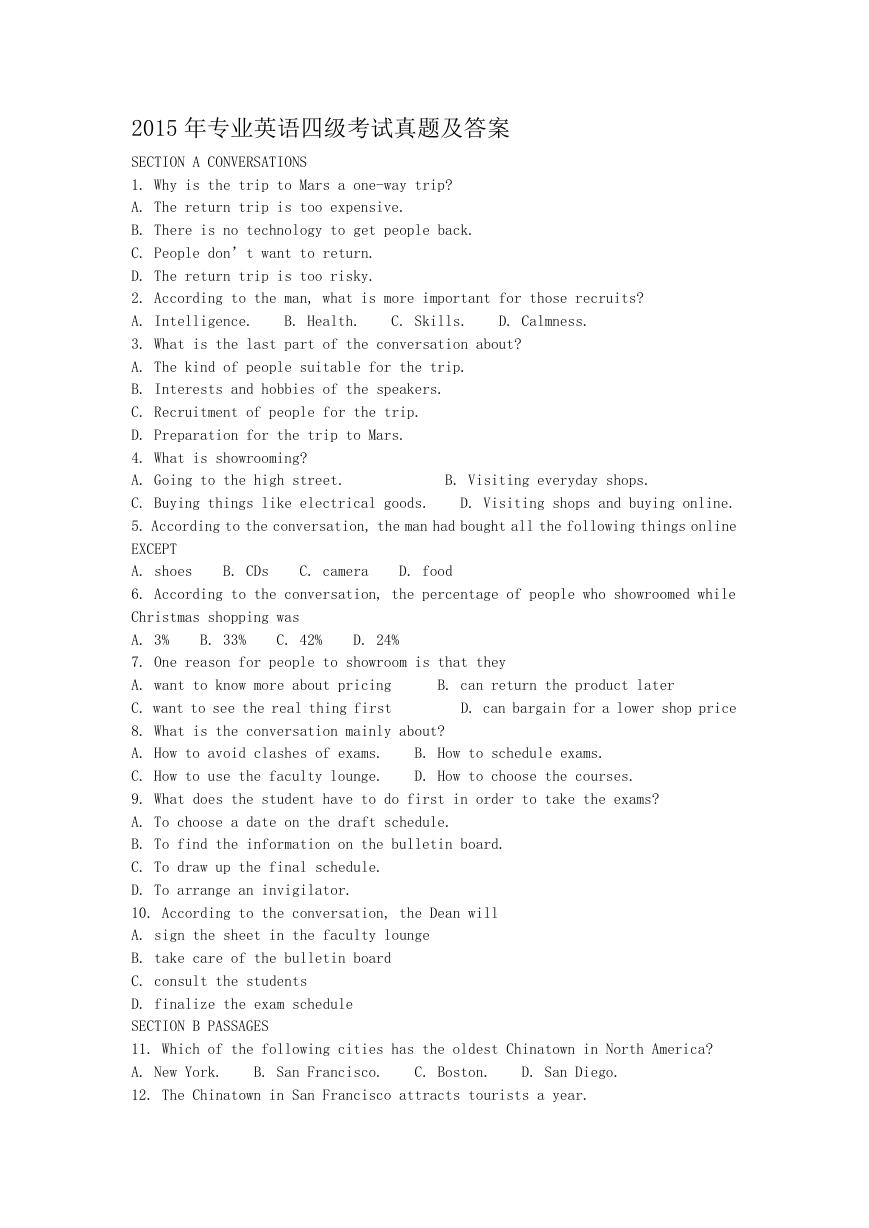
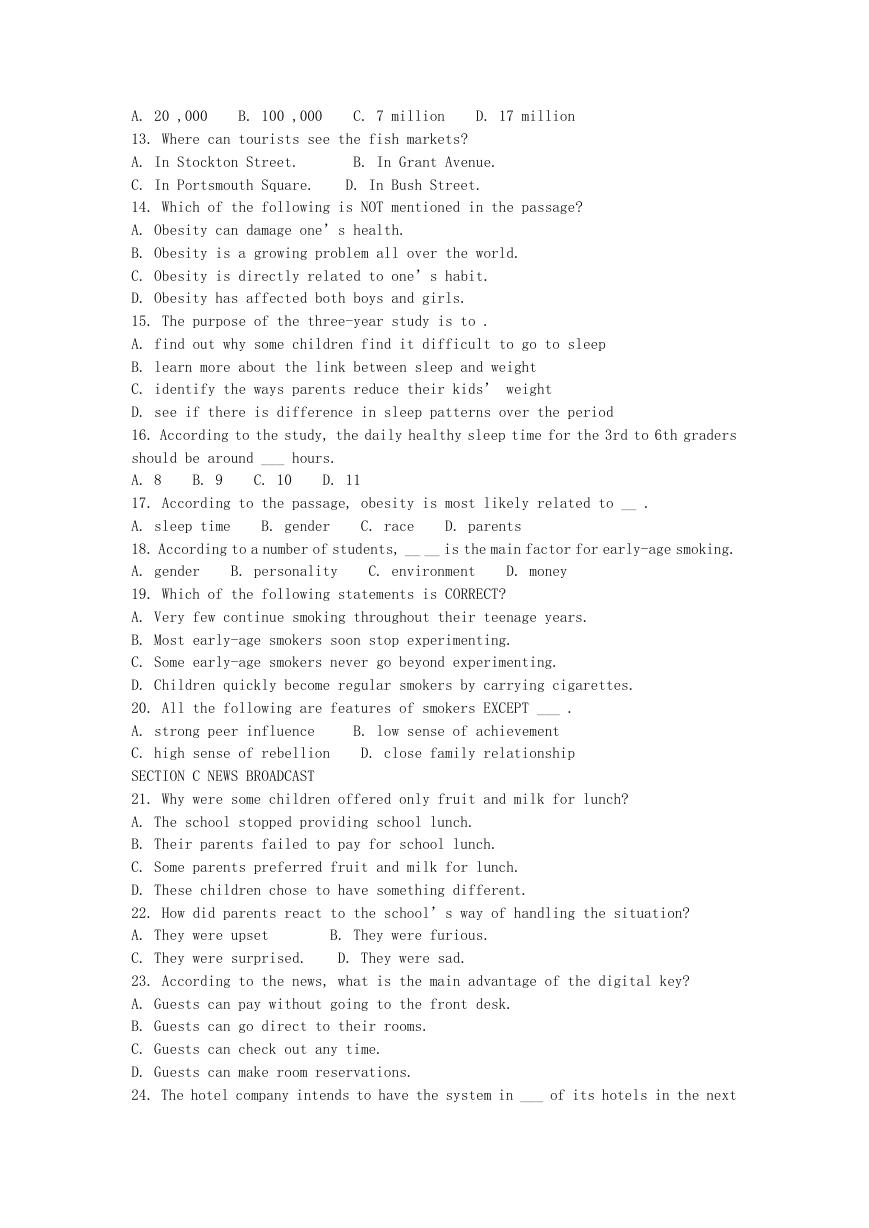
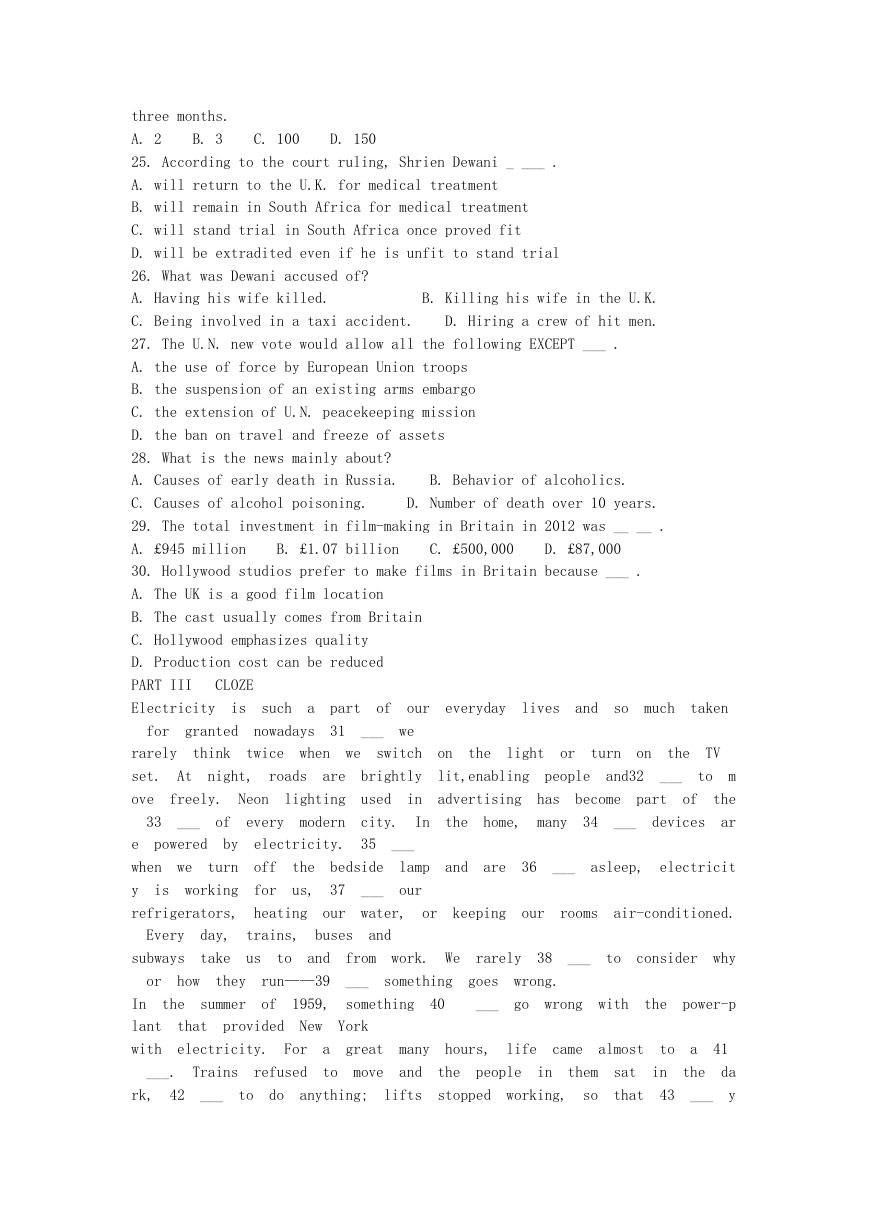
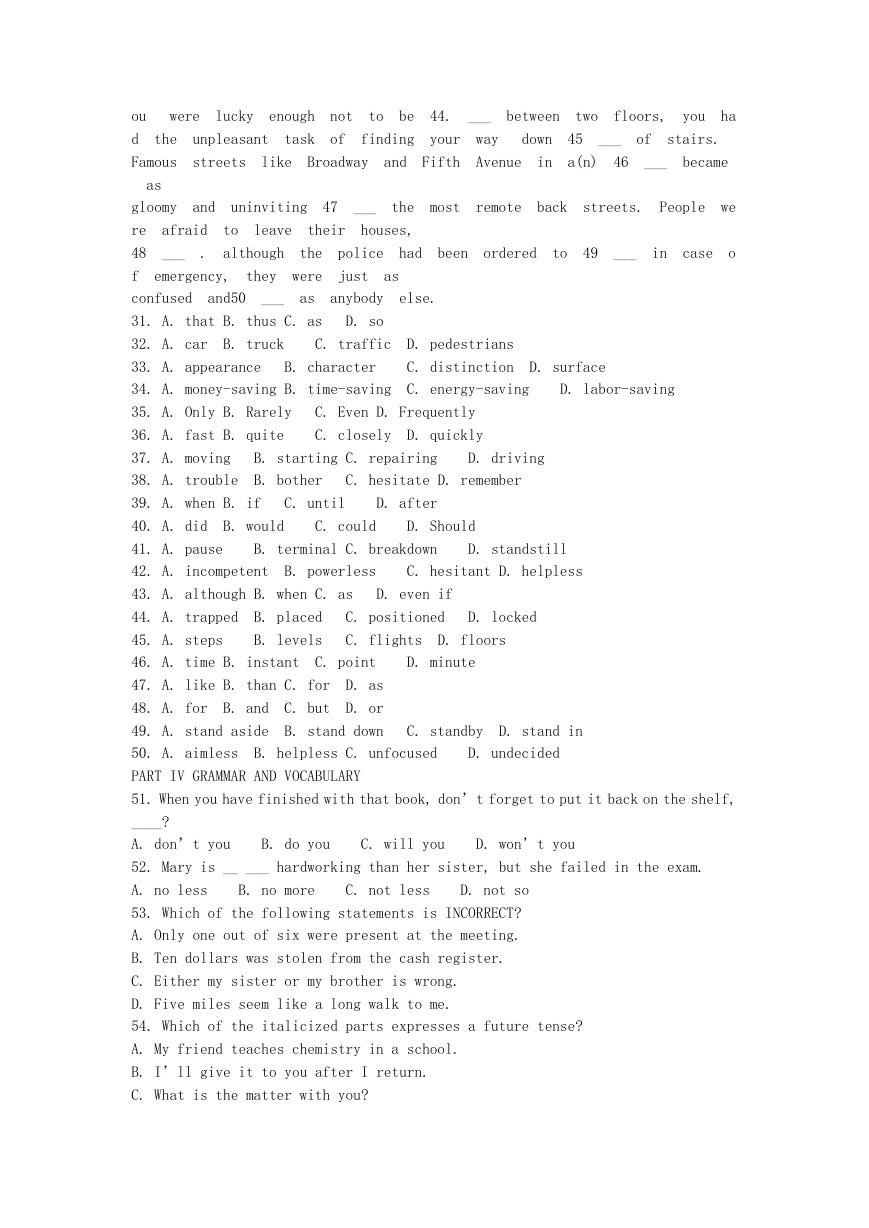
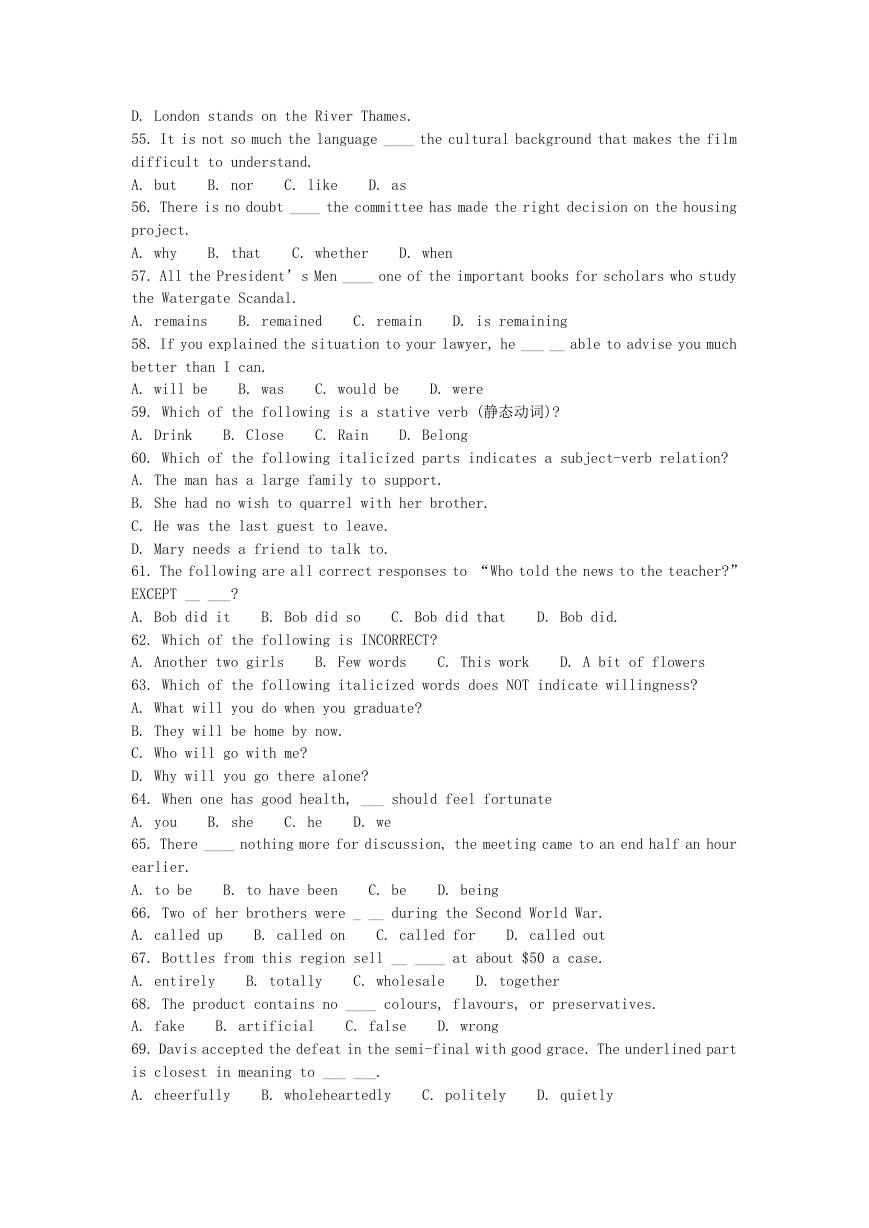
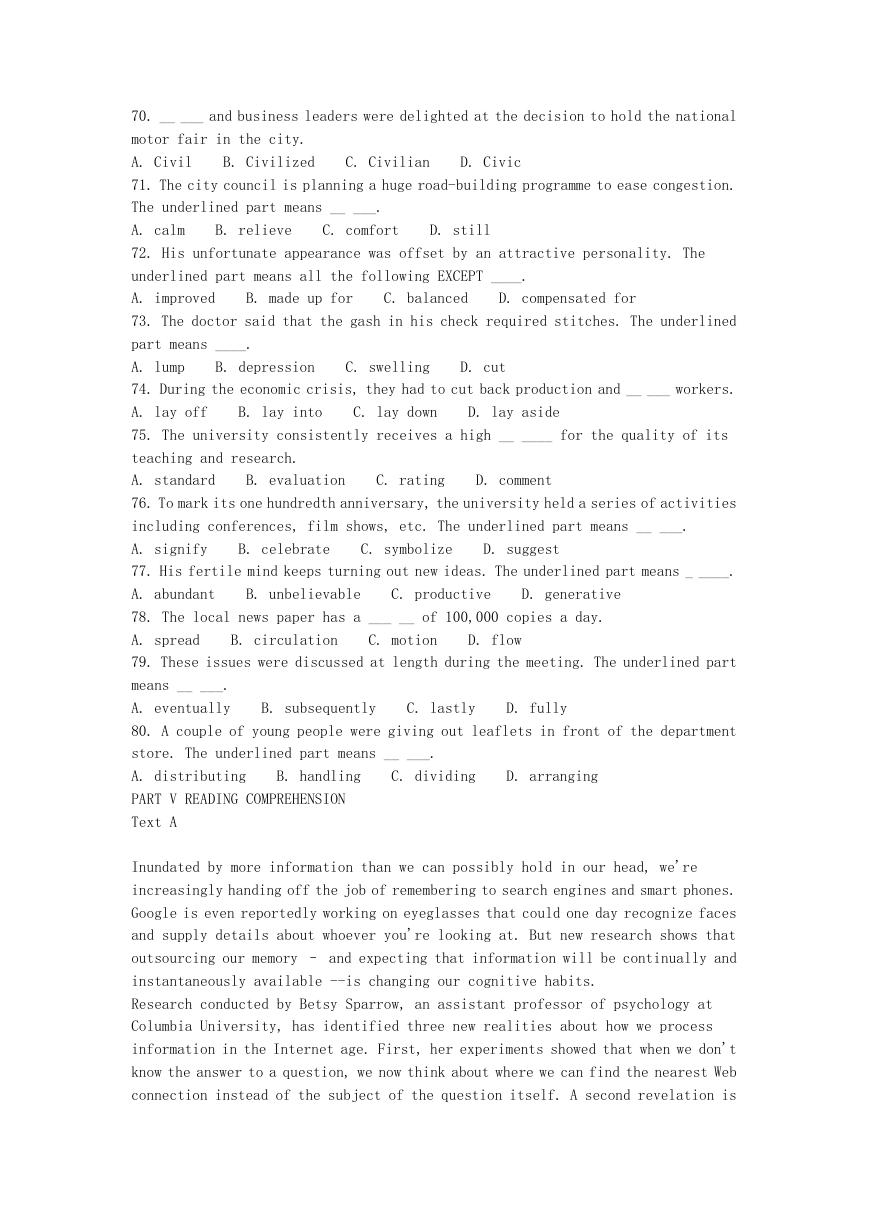

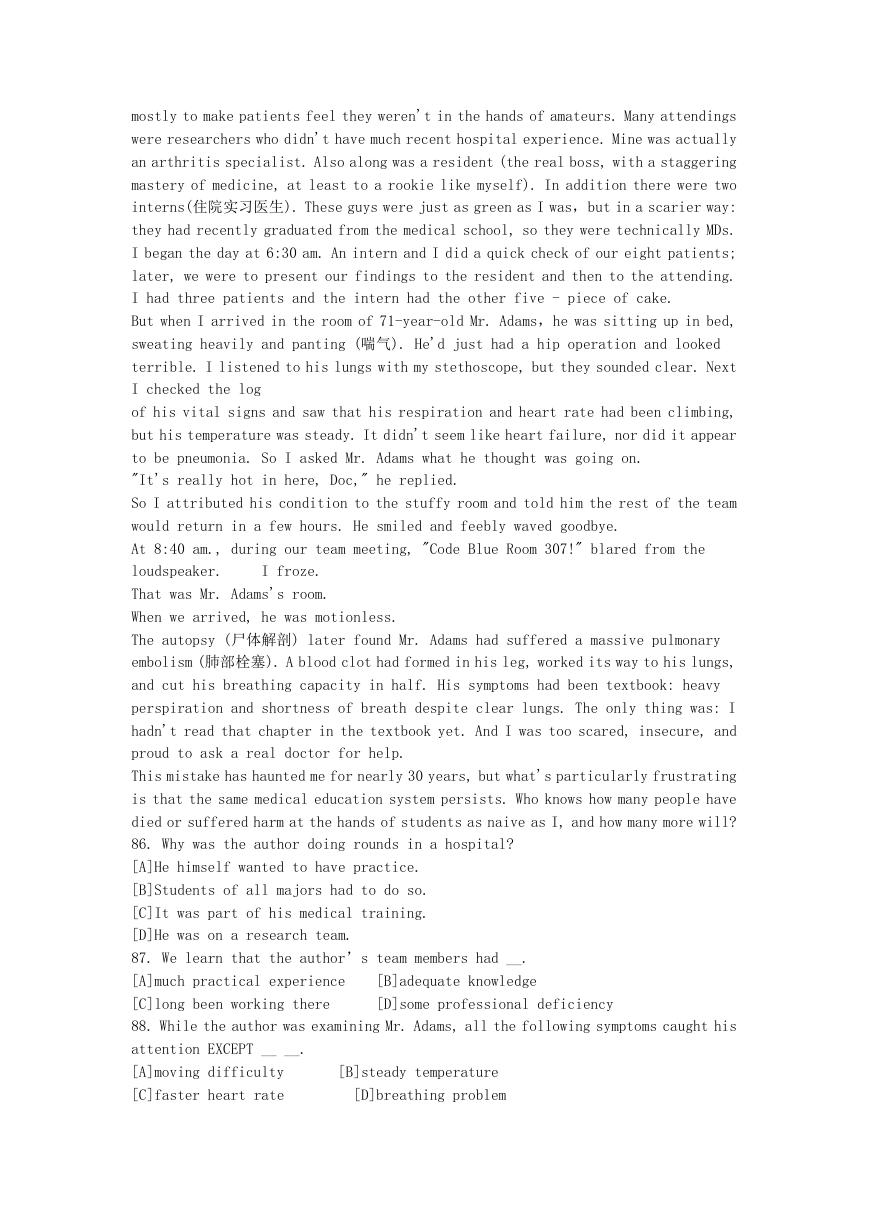








 2023年江西萍乡中考道德与法治真题及答案.doc
2023年江西萍乡中考道德与法治真题及答案.doc 2012年重庆南川中考生物真题及答案.doc
2012年重庆南川中考生物真题及答案.doc 2013年江西师范大学地理学综合及文艺理论基础考研真题.doc
2013年江西师范大学地理学综合及文艺理论基础考研真题.doc 2020年四川甘孜小升初语文真题及答案I卷.doc
2020年四川甘孜小升初语文真题及答案I卷.doc 2020年注册岩土工程师专业基础考试真题及答案.doc
2020年注册岩土工程师专业基础考试真题及答案.doc 2023-2024学年福建省厦门市九年级上学期数学月考试题及答案.doc
2023-2024学年福建省厦门市九年级上学期数学月考试题及答案.doc 2021-2022学年辽宁省沈阳市大东区九年级上学期语文期末试题及答案.doc
2021-2022学年辽宁省沈阳市大东区九年级上学期语文期末试题及答案.doc 2022-2023学年北京东城区初三第一学期物理期末试卷及答案.doc
2022-2023学年北京东城区初三第一学期物理期末试卷及答案.doc 2018上半年江西教师资格初中地理学科知识与教学能力真题及答案.doc
2018上半年江西教师资格初中地理学科知识与教学能力真题及答案.doc 2012年河北国家公务员申论考试真题及答案-省级.doc
2012年河北国家公务员申论考试真题及答案-省级.doc 2020-2021学年江苏省扬州市江都区邵樊片九年级上学期数学第一次质量检测试题及答案.doc
2020-2021学年江苏省扬州市江都区邵樊片九年级上学期数学第一次质量检测试题及答案.doc 2022下半年黑龙江教师资格证中学综合素质真题及答案.doc
2022下半年黑龙江教师资格证中学综合素质真题及答案.doc